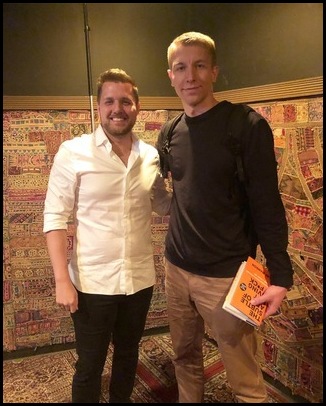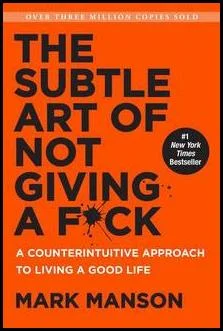Book Summary:
“The Subtle Art of Not Giving a F*ck: A Counterintuitive Approach to Living a Good Life” by Mark Manson provides readers with a counterintuitive guide to living a good life. Instead of trying to be happy all the time, Manson teaches:
Why problems are infinite, and why that is both a good and bad thing.
How adjusting your values can improve your quality of life.
Why you should take complete responsibility of your life.
And many more lessons.
There are only so many things we can give a f*ck about, so we need to figure out which things really matter in life. Manson’s book delivers the cold, hard truth while also sharing entertaining stories filled with profane humor. This book is a refreshing slap in the face for people to help them lead contented, grounded lives.
Got to meet Mark Manson at his book tour in NYC.
Book Lessons:
1) Problems are both good and bad
“Life is essentially an endless series of problems...The solution to one problem is merely the creation of the next one...Don’t hope for a life without problems...There’s no such thing. Instead, hope for a life full of good problems. ”
Every single person in the world has problems. It doesn’t matter if you’re rich, happily married and live in a nice house, you will still face the problem of managing your wealth, remembering your wife’s birthday and buying her a gift and keeping the house clean.
Being rich has its problems, as does being poor.
Having a family has its problems, as does not having one.
Being employed has its problems, as does being unemployed.
There is no such thing as a life without problems.
So what can you do?
“Hope for a life filled with good problems,” writes Mark Manson.
Having the problem of having too many good friends and not knowing which ones to hang out with is a good problem.
Getting accepted into all of the colleges you applied to is a good problem.
Planning a vacation that you won from being the number one salesperson at your company is a good problem.
The good news is that people also derive happiness from solving problems.
This is why people are constantly engaging in games, puzzles and challenges.
Since happiness comes from solving problems, happiness is a form of action or activity, not something you’ll magically discover. By taking action and solving problems, your body will reward you with positive emotions.
Since you can’t have a problem free life, it’s important to ask, “What pain do you want to sustain?”
Who you are is defined by what you’re willing to struggle for. People who enjoy the struggles of a gym are the ones who run triathlons and have chiseled abs and can benchpress a small house. People who enjoy long workweeks and the politics of the corporate ladder are the ones who fly to the top of it. People who enjoy the stresses and uncertainties of the starving artist lifestyle are ultimately the ones who live it and make it (page 40).
2) To have a good life, have good values
“The question is not whether we evaluate ourselves against others; rather, the question is by what standard do we measure ourselves?”
According to Mark Manson, here are the differences between good and bad values:
Good Values:
Reality-based
Socially constructive
Immediate and controllable
Bad Values:
Superstitious
Socially destructive
Not immediate or controllable
Honesty, for example, is a good value. It’s something you have complete control over, it reflects reality and it benefits others. Popularity, on the other hand, is a bad value. You have little control over what people think of you and you will spend too much time concerning yourself over every little action that may change your ranking.
When people have poor values, that is, poor standards, they are “essentially giving fucks about the things that don’t matter, things that in fact make our life worse” (88).
Manson proves his point by looking at the values of Dave Mustaine and Pete Best.
In the early 1980s, Dave Mustaine formed the legendary heavy-metal band Megadeth. Megadeth would go on to sell over 25 million albums and tour the world several times. Mustaine became incredibly wealthy from the band’s success and is considered one of the most influential musicians in the history of heavy-metal music.
Unfortunately, before he formed Megadeth, Mustaine was kicked out of the band Metallica. Arguably the greatest rock band of all time–Metallica has sold over 180 million albums, seven times that of Megadeth.
In a 2003 interview, Mustaine admitted he still considered himself a failure for being kicked out Metallica. By adopting the bad values of happiness equals being more successful than his former band, Mustaine felt like a failure even though he was worth millions of dollars, had countless fans and made a career out of something he loved to do.
Now compare that to the life of Pete Best.
Pete Best was also kicked out of a band, and not just any band, it was The Beatles.
Unlike Mutaine, Best didn’t go on to become a global rockstar or make millions of dollars, and yet, in an interview, he said he was happier without the Beatles.
Why?
Best said that getting kicked out of the band led him to meet his wife and then his marriage led to him having children. His values changed and he began to measure his life differently.
Instead of chasing glory and fame, Best sought out a loving family and happy marriage.
One would imagine that Dave Mustaine would be more satisfied with life since he achieved great fame and glory, but yet he felt like a failure whereas Pete Best didn’t become a superstar and yet is contempt with life because he simply changed his values.
Choose better values, and you too will have a better life.
3) Take total responsibility for your life
“There is a simple realization from which all personal improvement and growth emerges. This is the realization that we, individually, are responsible for everything in our lives, no matter the external circumstances.
”
This lesson may be one of the coldest and hardest truths to accept in Manson’s book. The truth that no matter what, you are responsible for your life and must respond to any punches life throws your way.
This doesn’t mean that fault and responsibility are the same things, but you still must take responsibility for things that aren’t your fault.
For instance, if you woke up one day and there was a newborn baby on your doorstep, it would not be your fault that the baby was put there, but the baby would now be your responsibility. You would have to choose what to do (feed the baby, call home services, etc).
In other words, fault is past tense and responsibility is present tense.
Here’s some more cold, hard truth from Mark Manson:
Many people may be to blame for your unhappiness, but nobody is ever responsible for your unhappiness but you. This is because you always get to choose how you see things, how you react to things, how you value things. You always get to choose the metric by which to measure your experiences (page 99).
Don’t fall for the victim mentality–it’s tempting to pass of the responsibility of solving your problems to others, but it won’t get you nearly as far in life as taking responsibility for your own life will.
This isn’t a new idea, Jocko Willink literally wrote a book called “Extreme Ownership” where he shares the most important lesson of leadership, taking complete responsibility and ownership of any situation.
Jordan Peterson also shares a similar lesson in his book, “12 Rules for Life.” Peterson writes that each and every one of us most shoulder as much responsibility as possible in order to improve our lives.
Your problems may not be your fault, but it is up to you, and you alone, to take responsibility of your life and take action to improve it.
Book Review:
“The Subtle Art of Not Giving A F*ck” by Mark Manson is equal parts insightful and entertaining. Manson has an incredible sense of awareness when it comes to life and looking at it from different perspectives, while also cracking poop jokes and talking about a superhero called “Disappointment Panda.”
This is the second time I’ve read this book, and I found it just as helpful and interesting as the first. At 200 pages, this book is quite easy to read and Manson’s stories about Buddha and rockstars keep readers engaged chapter after chapter.
Life is short, stop caring about things that don’t matter. Instead, read this book, focus on the things that do matter and take responsibility for your life.
Rating: 5/5 Stars
If you’re interested in this book, you can get it here.
You can also get the audio version of this book for free by signing up for a trial of Audible here.
Here are a few similar articles:
After reading 100+ books, here are the books I recommend reading.
Please consider supporting A&B or signing up for our monthly newsletter. Thank you!



